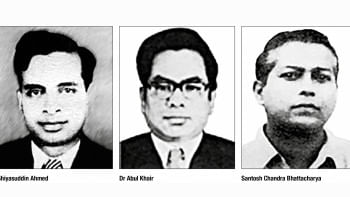We must foster intellectual growth

We join the nation in paying our heartfelt tribute to the intellectuals who were systematically killed near the end of the Liberation War in 1971, in what was a clear attempt to intellectually cripple the newly emerging country. We must say that even after 51 years since those dark days, the void created by the heinous actions of the Pakistani army and their collaborators has yet to be filled. The killings, which followed a careful selection of talented civilians from different professions that formed the intellectual bedrock of the nation, have left a deep mark on our collective psyche, and they will be missed forever.
Those who were targeted as part of this conspiracy were well-known and well-respected figures – representing various fields such as arts, education, literature, science, medicine, and so on – and could have contributed hugely to the development of the new country. They were, one can say, some of the greatest assets of this country at that point in our history. The enemy, clearly, wanted to destabilise the country and impede its future progress even before it was born, and we continue to bear that brunt even to this day. In this connection, it should be mentioned that even after all these years, Bangladesh still does not have a completed list of those who were killed; we are still in the dark about the exact number of martyred intellectuals. This is very unfortunate.
We call upon the government to step up and complete the list at the earliest possible time, so that people can know about all those who sacrificed their lives for us. We also urge the authorities and relevant stakeholders to take steps to foster the development of new intellectuals in the country, including through creating a proper environment for intellectual exercises, ensuring academic freedom, and making proper investments in education and research. They should also undertake programmes and scholarships that may help young Bangladeshi scholars to thrive and prosper.
Intellectuals of this land were historically recognised for their influence, but today, for reasons stated above as well as the overall socio-political environment at present, our intellectual contribution seems to have gone down significantly. Currently, conditions that might foster intellectual growth are being stifled, as the atmosphere for free, critical thought is absent. As such, we do not have many intellectuals to depend on to guide us through these times. Other than a few examples of scholars in some specific fields at home or abroad, much of our intellectual realm still remains empty. We must address this. We must foster an environment in which intellect can thrive, because without doing so, we may never fill the gap that the Pakistanis had left us with in 1971. We must not let their vicious plan become a permanent reality for us.


 For all latest news, follow The Daily Star's Google News channel.
For all latest news, follow The Daily Star's Google News channel. 








Comments